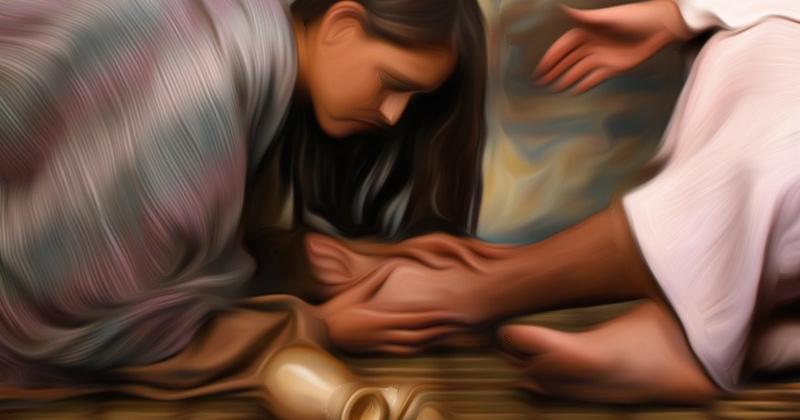The Gospel is taken from St Luke. It is the story of the sinful woman who washed the feet of Jesus with her tears, drying them with her hair. At any time, but particularly during this Extraordinary Jubilee of Mercy, this Gospel story should stop us dead in our tracks and cause us to take a very deep look at ourselves and our relationship with the Merciful Lord.
In the Gospel, this woman – whose name we never learn and who says not a single word – gives a very deep and powerful expression of her love for the Lord; her actions, performed so intimately and so genuinely, are a cry from her heart to His Heart – or rather, a response of her heart to His Heart. Here, actions speaks so much louder than words. Her actions are public and say much about how she sees herself in relation to the Lord, as well as her confidence in His mercy. That confidence is well founded.
The Pharisees, as usual, see only what is on the surface – appearance is, to them, what matters. What is in the heart is of no concern. Not so with the Lord – He sees the secrets of hearts. Remember the prophecy of Simeon – that Christ would be a sign of contradiction, that the secret thoughts of many would be laid bare. On this occasion, that prophecy bears fruit. Hearts are indeed laid bare – the hearts of the Pharisees, the heart of the woman, and the Heart of the Merciful Lord.
The Lord, after rebuking the Pharisees, has this to say –
“I tell you that her sins, though many, must have been forgiven, or she would not have shown such great love”.
The Lord reads hearts very well. He knows our motives, He knows our human failings and our sinfulness – and He knows how we can look upon ourselves with dismay when we realise our misery before Him. And on those occasions, as always, His look toward us is always the same – it is a look of mercy.
It is the very same look that He had upon His Face whilst dying for love of us upon the Cross; infinite compassion and mercy for mankind.
Perhaps we try to complicate things sometimes. Perhaps we try to limit His mercy, even though He Himself places no limits upon it – all we need do is ask for it and receive it with trust. He will do the rest. On the Cross, His mercy was without limit – and it remains so.
Reading an interview recently with a Friar who is greatly esteemed by the Holy Father, I read that he was worried that in the Confessional he was “too merciful”; he commented that going before the Tabernacle, he told this to the Lord, noting that in being merciful he was simply following the example of Christ, Who was ever-merciful.
I wonder if sometimes we hear the message of Divine Mercy and think it is too good to be true, that the Lord simply cannot be so merciful as we are told. Yet He is. It is as simple as that – the Lord is Mercy. He is Mercy Incarnate. And that mercy has no limit. It is an ocean of mercy and our misery – no matter how great we believe it to be – is nothing more than a single drop, cast into that ocean and gone forever.
This is the constant message of the Gospel, it is the beating heart of our Faith, and it is the single message which the Holy Father never tires of repeating.
Like the woman of the Gospel today, may we come to see and recognise our sinfulness, our misery, before the Lord; and also like this woman, may we have perfect trust in approaching Him and asking His mercy, knowing with confidence that He will give it to us.
